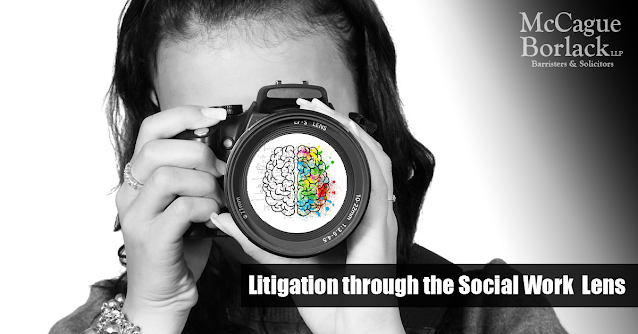Many people believe that the fields of law and social work are opposites. As a summer student having spent even a short amount of time in a law firm, I can attest that there is in fact a fascinating overlap between the two disciplines.
Within the tight-knit MSW/JD community, I’ve heard it put this way:
Law is public regulation and social work is public administration.
I’ve also heard that “An MSW/JD is like a lawyer, except with a soul.” (I’ve chosen to include this because this blog has definitely not seen enough bad lawyer jokes! Wink!)
What I love most about starting in a law firm as an MSW/JD student is being able to look at the law through the social worker’s lens. Social workers learn methods and theories in psychology, psychotherapy, health, behaviour, and human dysfunctions, and apply this expertise through a diverse range of social and client interventions. In essence, social workers are trained to predict and interpret human behaviour, and the stakes can be incredibly high. We’re made to predict whether parents will abuse their children; if persons suffering from addiction are at risk of jeopardizing their sober living facilities; and whether historically violent parolees will re-offend.
There’s a constant mental assessment happening: Is this person a threat? Are they lying to me? How are they going to act when I leave the room? What makes them tick? What keeps them calm? Something doesn’t feel right, but I can’t put my finger on it, and I must make my recommendation today: What level of risk does this person pose to themselves and to others?
The roots of frontline social work and the roots of litigation are very much alike. The question we’re continuously asking ourselves as litigators is: What is the other side going to do next? How will they react to what I’m advancing? What can I do or say that will make them understand me? What can I do or say that will help them feel understood?
Whether your audience is a judge, a jury, or opposing parties, one of the main goals in litigation is to appeal to what moves them and persuade them to your side. Legal strategy is partly a game in psychology, which is why using the social work lens to tap into human drives, patterns, emotions, and shortcomings is a powerful advantage.
While they do seem like polar fields at times, social work and law are, in my view, quite complementary. It will be fascinating to watch how social work influences my perspective on the law, as well as how my peers’ backgrounds shape their own emerging legal practices. As a very new, little fish in a big, lawyer-y pond, I’m fortunate to be finding some comfort in the commonalities between the social work side of me and the litigator-in-training side of me here at McCague Borlack.
As an aside, I wanted to share my favourite books related to the fascinating intersections of psychology and argument…Bringing a little MSW to the JDs, as it were!
- Predictably Irrational – Dan Ariely
- The Gift of Fear – Gavin DeBecker
- Talking To Strangers – Malcolm Gladwell
- Freakonomics / Think Like a Freak – Steven D Levitt and Stephen J. Dubner
- Thank You for Arguing – Jay Heinrich
By Becka, Concurrent MSW/JD Summer Student

